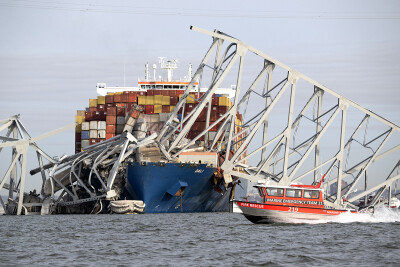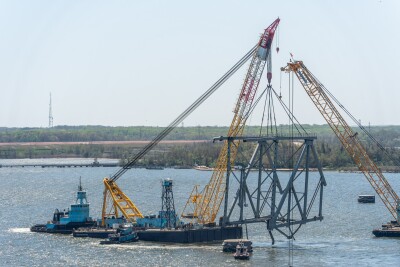Editor’s note: This is the second in a series of mariner interviews conducted by Kim Carver.
Kim Carver: What does your job entail?

Heather Kelleher: My job is very managerial. I make sure daily vessel maintenance and cleaning gets done. I also usually drive the boat, whether on a voyage to a rig or maneuvering around port and into berths. I supervise the crew operating the crane, document all cargo transfers and ensure that our stability calculations and paperwork are current. I work with the other officers to ensure that job safety paperwork, vessel documentation and logs are correctly completed on time. Since I am responsible for all of safety equipment on board, I conduct weekly and monthly checks, confirming that equipment is fully functional and where it should be. I also conduct drills for fire, MOB, abandon ship, security, and spills.
KC: What is your story?
Heather: When I was 11, I was a big bad sixth grader at my elementary school, and finally made it into Miss Nielsen’s class. Her class did ‘The Ship Trip’ every year. The whole class overnights on a tall ship at Hyde Street Pier in San Francisco. At the end of the year they actually sail on a real live tall ship. That year I was doing both trips. We learned everything from how hard it was to be a common sailor 100 years ago, to knots and the names of sails. We made our own hardtack. We were warned that we would have to stand a night watch — an entire hour in the middle of the night. The day finally arrived, and we stood on the pier with our backpacks and sleeping bags, looking at a huge lumber schooner built in 1895 named C.A. Thayer. The day passed in a blur of activities and laughter. Finally, it was time to sleep. At 11 I had no trouble squirming into my sleeping bag and falling asleep on my bunk’s hard wooden slats. Suddenly, I was awakened by a hand on my shoulder. I was disoriented for a moment in the dark foc'sle, but in no time I was dressed and on deck. My watch mates were awake as well but we were stationed so far apart around the ship that communication was impossible. We were to watch in silence, no easy task for an 11 year old. I heard the quiet lap of the bay against the Thayer's hull and the occasional call of a seagull. The city lights reflected on the water. For a whole hour, an eternity, I stood in silence and watched the night, and little did I know then that I was already falling in love. I was falling in love with the quiet, the smell and sound of the water, and the sigh of the chilly pre-dawn breeze. I was falling in love with the feeling of teamwork as my crew kept the rest of the class safe while they slumbered, and the little comforts brought about by the discomfort of standing in the cold. I was falling in love with tumbling back into my bunk after a night on watch, safe and warm, knowing that the next crew will now keep us safe. In short, I was falling in love with being a mariner. A seed was planted, and began growing in the fertile mind of the 11-year-old me. Years later, I began my career on tall ships. I filled every position from cook to bosun to mate on square-riggers and schooners around the world. Along the way, I picked up practical skills like caulking and welding, sail repair and rigging. I found that I had a knack for living and working with others in very small spaces. If you cannot work together, the boat cannot function. Nothing teaches you cooperation, tolerance, and respect like working on a boat.
KC: How did you come to be an OSV mate?
Heather: With my sea time on tall ships, I applied to work in the Gulf of Mexico on OSVs. Tall ship work is exhausting, but OSVs are true workboats. There is no public to entertain or teach. You load and deliver cargo. But the important skill sets remain the same. Sanding, painting, teamwork and trust are no less important. The fundamentals I first learned easily transferred to my career offshore. The OSV still plies its trade upon the water, and I still get to breathe fresh salt air and watch waves foaming from the bow as we steam along. I see impossible stars you can only view at sea, and spectacular sunsets and sunrises that one cannot see from shore. I still get to work in close-quarters with people who have to get along and work together, and I help make all of this successful. I joined ECO as an AB, cleaning toilets, grinding rust, rigging deck cargo and standing watch. This helped prove that I was no stranger to work, earning me the respect so many struggle to achieve, and it allowed me to understand how the boat was run from the ground up. I know each job required of deck crew firsthand, including how long each job takes. This helps me in my job as mate. I get my hands dirty working alongside my crew. I didn't come to sea to sit in a safe little cubicle. I came to sea to use my muscles and breathe clean air, and work with people who feel the same way.
KC: What is your work schedule and how do you spend your time off?
Heather: I work 28 days on, 14 days off. That’s 28 days straight through, almost never leaving the boat. On board it’s 12 hours on, 12 hours off. I often exercise, as my position involves a lot of sitting down. Some days I knit, watch a movie, or talk on the phone with family and friends. My 14 days off are a free-for-all. After taking care of business that cropped up during my time on the boat, I am on vacation. First and foremost, I sleep in. After 28 days of having to be awake at a certain time, I love lazing about in my own bed. I visit friends around the country, hike, and go on road trips with my husband. Two straight weeks off allows me the luxury to continue one of my passions: traveling. I love taking trips on my days off. I also relish the chance to be well and truly alone. While I thrive on the stimulation of the enforced social atmosphere of a boat, it is really nice to sit on the couch by myself and unwind.
KC: What advice would you give to people just entering the industry?
Heather: The maritime industry is huge. There are boats that do every kind of job, from diving holidays to Antarctic exploration. The possibilities are endless. Do your research. Do not get stuck in the first job that comes your way. If you need the cash, sure, take it, but always remember there is always the opportunity for change and advancement. You will have to take classes. Even hawsepipers take classes. Suck it up and sit through them. Try to find a school that can teach you more than just what is on the test. There are a ton of schools out there — keep learning, keep growing. We mariners spend more times at our jobs than almost any other profession, too much time to hate what we do. Love what you do, because you live it. I do.




